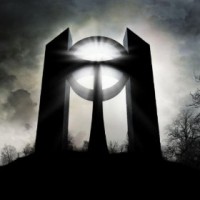"Visitation", the track that bleeds into the centerpiece of Amebix's first new album in 24 years, features a speaker addressing an entity that refuses to identify itself, yet the entity repeatedly insists that the speaker already knows what it is. Between the rumbling bass, shifting guitar, and haunting synthesizer, the entity seems to encapsulate something that acts with an ageless disregard towards those that it affects. There is no better exchange between man and nature that could more perfectly encapsulate Amebix millennia three.
After reforming in 2009, and re-recording some older material, Amebix eventually began recording new material, composed of original members (and brothers) Rob Miller and Stig, as well as American drummer Roy Mayorga. While "reunion albums" can be perilous affairs, fraught with the shackles of high expectation, preconceived notions, and age, the fathers of crust punk create an album that both hearkens back to their past while branching outwards, creating the most diverse–and tightest–album in their catalogue.
From the first track, "Days", Amebix announce that they are not simply content to ape their former selves. While the stereotypical Amebix tune is a rumbling mass of Motörhead-like growling and basslines as thick as tar, "Days" is unique in the band's restraint. Echoing Joy Division as much as Bauhaus, Miller pulls from a cold, calm place musing on the transience of his own life in a voice that is more Ian Curtis than Lemmy.
Although "Days" fades into a still nothingness, near the end, the classic Amebix chug-chug-chug roars over top and the group completes the ouroboros of the old and new. Miller's voice retains the slimy bark from the group's classic Arise! and his bass, still charging forward at an energetic plod, seems to have sunk even deeper into the depths of murk. Guitarist Stig has become more technical since the last Amebix full-length, transitioning his sound to and fro from a thrash cadence to a classical/gothic arrangement. Interestingly, new drummer Mayorga incorporates the classic relentless chug of Amebix with a modern catch-and-release attack, making the music seem timely and timeless. (Also, he has this really neat cymbal that sounds like a copper kettle that when pinged, seems really scary even though it's just a piece of metal being smacked.)
But while the band balances the old and the new, Sonic Mass is elevated to being more than the sum of its parts when the two poles are intertwined. At times the band mixes the acoustic with the electric. At others, tribal drumming and chanting is supported by their grimy rumble. Most interestingly, though, are the times when the band drops weird clips, sound effects, and ghosts of other recordings throughout the album, tying the different pieces together in a way that is as much Pink Floyd as it is Black Sabbath as it is Lee "Scratch" Perry.
While the newer sonic elements are somewhat radical departures from what the band has recorded previously, Miller's lyrics continue their trajectory into the ancient metaphysical. Having lived in a remote village in the Isle of Sky known for its 2,000-year-old man-made caverns has obviously influenced the grower's lyrical bend, Sonic Mass uses Euro-pagan symbolism as metaphors for modern life as much as it literally preaches pagan beliefs. "God of Grain" features the vocalist describing resurrection as a symbol for the harvest as he adopts the mantle of the world's grain gods in succession, including Osiris, Dionysus, and Jesus. The album's namesake is a lamentation that would fit with equal familiarity on the fields of Europe circa 1348 as it would the plains of Afghanistan circa 2011.
Just as the speaker of "Visitation" was having trouble naming the thing before him, it's difficult to apply simple tags to Sonic Mass. Is it metal or punk? Is it a comeback album or is it an album that really took 24 years to make? Further investigation only makes the question itself murkier until it becomes irrelevant, and shows that the release comes from something deeper and more ancient than modern words can describe. Rather, the term "Mass" will have stand in as a substitute with all of its connotations and definitions describing the object in part, but never completely.
